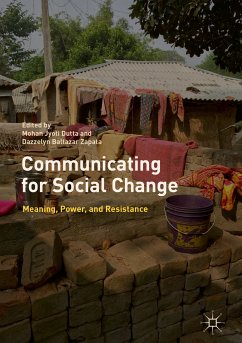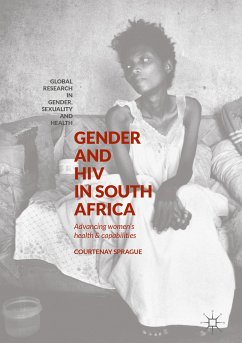The book covers the trajectories and trends in social change communication, engaging the key theoretical debates on communication and social change. Attending to the concepts of communication and social change that emerge from and across the global margins, the book works toward offering theoretical and methodological lessons that de-center the dominant constructions of communication and social change. The chapters in the book delve into the interplays of academic-activist-community negotiations in communication for social change, and the ways in which these negotiations offer entry points into transformative communication processes of social change. Moreover, a number of chapters in the book attend to the ways in which Asian articulations of social change are situated at the intersections of culture, structure, and agency. Chapters in the book are extended versions of research presented at the conference on Communicating Social Change: Intersections of Theory and Praxis held atthe National University of Singapore in 2016, organized under the umbrella of the Center for Culture-Centered Approach to Research and Evaluation (CARE).
Mohan Jyoti Dutta is Dean's Chair Professor and Director of the Center for Culture-Centered Approach to Research and Evaluation (CARE) at Massey University, and Adjunct Professor of Communication at Purdue University. Professor Dutta's research works at the intersections of communication for social change and postcolonial/Subaltern Studies theories, voicing the erasure of subaltern voices through dominant discursive processes of knowledge production and working simultaneously through co-constructive processes toward fostering spaces for listening to subaltern voices that have hitherto been erased.
Dazzelyn Baltazar Zapata is Lecturer in the Department of Communications and New Media at the National University of Singapore.
Dieser Download kann aus rechtlichen Gründen nur mit Rechnungsadresse in A, B, BG, CY, CZ, D, DK, EW, E, FIN, F, GR, HR, H, IRL, I, LT, L, LR, M, NL, PL, P, R, S, SLO, SK ausgeliefert werden.
Produktdetails
- Verlag: Springer Nature Singapore
- Seitenzahl: 413
- Erscheinungstermin: 5. Dezember 2018
- Englisch
- ISBN-13: 9789811320057
- Artikelnr.: 54717299
- Verlag: Springer Nature Singapore
- Seitenzahl: 413
- Erscheinungstermin: 5. Dezember 2018
- Englisch
- ISBN-13: 9789811320057
- Artikelnr.: 54717299
Die Herstellerinformationen sind derzeit nicht verfügbar.
Mohan Jyoti Dutta is Dean's Chair Professor and Director of the Center for Culture-Centered Approach to Research and Evaluation (CARE) at Massey University, and Adjunct Professor of Communication at Purdue University. Professor Dutta's research works at the intersections of communication for social change and postcolonial/Subaltern Studies theories, voicing the erasure of subaltern voices through dominant discursive processes of knowledge production and working simultaneously through co-constructive processes toward fostering spaces for listening to subaltern voices that have hitherto been erased. Dazzelyn Baltazar Zapata is currently a lecturer at the Communications and New Media Department, National University of Singapore. Dazzelyn has worked on various social change research projects with the Center for Culture-Centered Approach to Research and Evaluation since 2014. Indigenous peoples, representation, development, health communication, and ICT use in marginalized settings are Dazzelyn's research interests.
1. Introduction: Theory, Method, and Praxis of Social Change.- 2. Self-reflexivity for Social Change: The researcher, I, and the researched, Female Street Based Commercial Sex Workers', Gendered Contexts.- 3. Gaze as Embodied Ethics: Homelessness, the Other, and Humanity.- 4. Development Communication And The Dialogic Space: Finding The Voices Under The Mines.- 5. The Kapwa In Compassion: Examining Compassionate Healthcare For Vaw Victims Among PGH Healthcare Providers.- 6. Mama, Home And Away: Philippine Cinema's Discourse On The Feminization Of Labor Migration.- 7. "Long-Distance Parenting: A Media Ecological Study on Values Communication between Migrant Parents and their Children in Paete, Laguna".- 8. Harnessing the Potential of Communication for the Well-Being of Transnational Families.- 9. The Health Communication Advocacy Tool: An Approach toward Addressing Health Inequity.- 10. Self-Reflexivity in DevCom Research: An Autoethnography.- 11. Participatory Communication And Extension For Indigenous Farmers: Empowering Local Paddy Rice Growers In East Java.- 12. Going Viral: Online Goal Emergence And Adaptation In The Anti-Human Trafficking Movement.- 13. Communication Platforms and Climate Change Adaptation of Rice Farmers in Lipa City, Batangas, Philippines.- 14. Integrative Medicine Focus Groups as a Source of Patient Agency and Social Change for Chinese Americans with Type 2 Diabetes.- 15. Culture-Centered Social Change: From Process to Evaluation.- 16. Embodied memories and spaces of healing: Culturally-centering voices of the survivors of 1965 Indonesian mass killings.- 17. Inequalities and workplace injuries: How Chinese workers cope with serious diseases caused by benzene poisoning.- 18. Media Portrayal Stigma Among Gender and Sexual Minorities.- 19. Epilogue.









